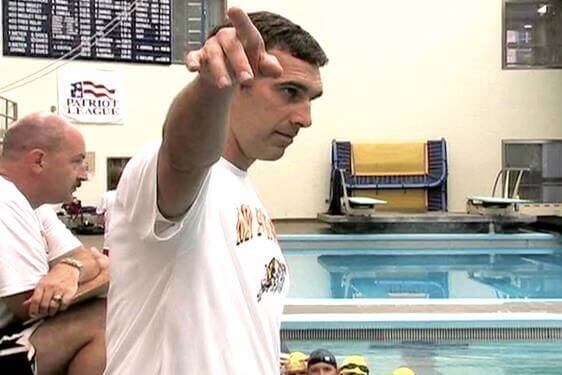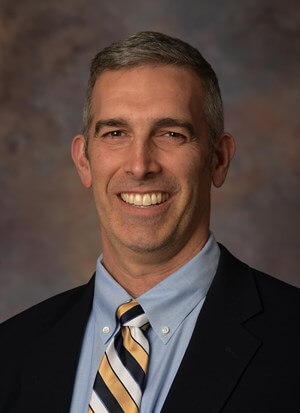Q&A With Naval Academy Coach Bill Roberts – Mentor of 18 Straight Patriot League Title Teams

Q&A With Naval Academy Coach Bill Roberts – Mentor of 18 Straight Patriot League Title Teams
Navy coach Bill Roberts has helped imbue the Academy’s core values of “Honor, Courage and Commitment” into his athletes as they have sailed to the last 18 Patriot League titles.
Get Swimming World Magazine and Swimming World Biweekly FREE When You
Become A Member of the International Swimming Hall of Fame
New! 30 Day Membership to ISHOF AND Digital Swimming World Subscription for just $10 a month!
Want more? Get a 1 Year ISHOF Family Membership With Swimming World Print AND Digital Subscription Order Now!
Non-Subscribers Can Download This Issue Here
• Springfield College (Mass.), B.S., physical education, 1992 (2x captain); East Carolina University, M.A., athletic administration, 1996
• Head coach, United States Naval Academy, 2003-present
• Head coach, Colgate University, 2000-03
• Assistant coach, United States Naval Academy, 1997-2000
• Assistant coach, Villanova University, 1996-97
• Graduate assistant coach, East Carolina University, 1994-96
• Women’s head coach, Wells College (Aurora, N.Y.), 1992-94
• Head coaching record at Navy: 192-63
• 10x Patriot League Coach of the Year, 11x ECAC Coach of the Year
Bill Roberts, whose Navy teams have won the last 18 contested Patriot League Championships and 12 of the last 13 ECAC crowns, has coached 37 Navy swimmers to the Olympic Trials: 2004 (1), 2008 (3), 2012 (13) and 2020-21 (20).
Q. SWIMMING WORLD: How did you first get into swimming?
A: COACH BILL ROBERTS: I grew up doing recreational swimming in lakes and pools in the Village of Aurora by Cayuga Lake in upstate New York. I started competitive swimming in ninth grade.

Photo Courtesy: Navy Athletics
SW: And then into coaching?
BR: I always knew I wanted to work in athletics and specifically as a coach. College coaching appealed to me because I liked the concept of building a program and all that it entailed.
SW: What motivated you to attend Springfield College in Massachusetts?
BR: I wanted a school with a strong PE/coaching reputation. Springfield stood out for its reputation in producing coaches in all sports. Not a lot of college coaches were calling our house for my swimming abilities, so I had to find a program I really liked in case college swimming did not work out.
SW: Who were some of your coaching influences?
BR: Several coaches had massive influences on my coaching progression. John Taffe at Springfield was instrumental in guiding me out of college into coaching. We maintain a great relationship and am forever grateful for his support and time along the way!
Coach Rick Kobe at East Carolina offered me my first Division I position. He essentially handed me the keys to most of the men’s team duties and trusted me as an unproven coach. I learned a lot through trial-and-error and realized nothing comes easy.
Ed Bartsch at Villanova was extremely demanding of his athletes and his staff. At the time, I struggled working for him, but he was a fountain of knowledge, and I learned a lot.
I spent the next three years working for Lee Lawrence at Navy, where I learned a ton. Lee was nearing the end of his career, and it was great for me to learn from a veteran coach. One of the many things I learned from Lee was how well organized he was in the office. So much of our workday is taken up by administrative “to-do” lists. Lee was really good at getting this taken care of so he could walk on deck and just coach.
Former Johns Hopkins coach and president of CSCAA, George Kennedy, has also been a huge influence. We have shared the deck on many occasions. It’s hard to overstate what a resource he is for our sport and our society.
SW: The admissions process for the Naval Academy is extremely competitive and includes a nomination process. Does this restrict your recruiting efforts?
BR: No. While it requires more time on the front end, the benefits of a Naval Academy education are endless. Most applicants enter the process with their goals set and are willing to take the extra steps to get there.
SW: How do you get your athletes to maintain efficiency in practice?
BR: It is a constant sales pitch. If you want to maintain your maximum potential for speed, you have to be fully committed to each and every stroke, every start, turn and finish, etc. You have to ask for—and constantly expect—buy-in. It is in a challenging set, when an athlete is fatigued and the brain is saying back off a little, that is where athletes have the opportunity to affirm their commitment to growth and excellence. They need to master Monday through Friday if they are going to be great on Saturday.
SW: Most of your swimmers come from programs with solid summer long course training. Yet with all the service academy summer obligations, how does Navy help them compensate for the lack of same when they return in the fall?
BR: Excellent question. The bottom line is taking advantage of each and every opportunity. We are very honest with recruits and let them know that it may not be a traditional summer in terms of straight training. However, they can still train during most of their Navy summer commitments. In many instances, there is at least a pool, if not a team, associated with most Naval and Marine Corps bases. Often, our athletes are in Annapolis, where we have practices running through the spring and summer.
Again, it goes back to mindset and having your goals set. We had a record number of athletes at the 2021 Olympic Trials. It took a lot of LCM training and competition to get that many to Omaha.
SW: Does your situation affect your ability to develop top distance swimmers?
BR: No. We get guys qualified for NCAAs and Olympic Trials in the longer events. Of course, we would love to train throughout the entire summer. Fortunately, our guys are really good at staying in good shape even when they may not have pool access.
SW: You teach Midshipmen swimming classes at the Naval Academy. Does that affect the way you coach at all?
BR: It has helped immensely. It has made me a better teacher and coach. Time and again, I get ideas from teaching class during the day.
SW: In what do you take most pride at the Naval Academy?
BR: For one, working for a school that has a clearly defined mission that coincides with running a successful athletic program. The Naval Academy does a tremendous job of teaching teamwork. Also seeing a Midshipman overachieve as a student, an athlete and a person. This is a challenging environment. It is really awesome to see team members and all Midshipmen excel during their time at Navy. The sense of pride one gets when present for the Naval Academy commissioning week and ceremony is overwhelming.
SW: How are the institutional values of “Honor, Courage and Commitment” reflected in your coaching?
BR: By living those core values. We need to be out front and very visible for our team members. We cannot assume or take these values for granted. Living them is a constant process that can be messy and sometimes non-linear. It is important that when they leave here, they are ready to live by and apply those values.
SW: And how do these values impact your recruiting process?
BR: We can discuss these concepts with recruits and their parents knowing we have a school that backs it up.
SW: As a top liberal arts college, how do your athletes balance swimming, classes, study, formal parades and Midshipman officer responsibilities…and still achieve such outstanding results?
BR: It boils down to having and knowing your goals. Not only at Navy, but at any school, a collegiate swimmer needs to live most of their lives without balance. There is always going to be more that a person wants to do than they may have time for in all aspects of life. We dedicate a good amount of time to goal setting and guiding our athletes toward being masters of their own schedules 24/7/365. The cliché that we all have the same amount of time in a day is so true. How we use our time is a separating factor for sure.
SW: From whence comes the Naval Academy’s obsession about beating Army – at anything?
BR: I am sure it began with a slight by a General to an Admiral or vice versa, and off we were running with a tremendous rivalry. There is no doubt messaging begins long before they get to the pool.
SW: If you are caught working out, what would you be caught doing?
BR: Draining 3’s on the basketball court at noon. Hopefully, at least four games in an hour and then a 300-400 cool-down swim right afterward. Then onto the back half of the day. Life is good!
SW: If your team were to play a walk-out song for you when you stepped on deck for practice, what song would you want to hear? And if you could choose one musician to coach with you, who would it be and why?
BR: If my team is selecting, they will have American Idiot on repeat. I love Green Day, and they get to call me an idiot, so everyone is happy. If I am picking the song, we are turning up the volume to The Pretender by the Foo Fighters. For the musician, it will be Dave Grohl. He will not stop moving around; he is going to tell stories throughout. He will make you laugh and is not afraid to break a leg. He will most likely go into the pool once or twice per practice, and he has a keen sense of when to use profanity to excite the audience!
Michael J. Stott is an ASCA Level 5 coach, golf and swimming writer. His critically acclaimed coming-of-age golf novel, “Too Much Loft,” is in its second printing, and is available from store.Bookbaby.com, Amazon, B&N and distributors worldwide.



